2022-2023 学年上海市奉贤区高三上学期期中英语试题及答
案
考生注意:
1. 考试时间 120 分钟,试卷满分 140 分。
2. 本考试设试卷和答题纸两部分。所有答题必须涂(选择题)或写(非选择题)在答题纸上。
3. 答题前,务必在答题纸上填写准考证号和姓名,并将核对后的条形码贴在指定位置上。
Ⅰ. Listening Comprehension
25%
Section A
Directions: In Section A, you will hear ten short conversations between two speakers.
At the end of each conversation, a question will be asked about what was said. The
conversations and the questions will be spoken only once. After you hear a
conversation and the question about it, read the four possible answers on your paper;
and decide which one is the best answer to the question you have heard.
1. 【此处可播放相关音频】
A. Shocked.
B. Sad.
C. Anxious.
D.
Annoyed.
【答案】A
【解析】
【原文】W: Marcia and Harold are getting divorced
M: I can’t believe it. I always thought they were so well suited to each other.
Q: What was the man’s reaction to the news?
2. 【此处可播放相关音频】
B. $18.
C. $30
D. $33.
A. $15.
【答案】C
【解析】
【原文】M: We want to book a room. How much does the room cost?
W: A single room is $18 per night, and a double room, $15 for one bed.
�
Q: How much does the man have to pay for a double room?
3. 【此处可播放相关音频】
A. He had his son buy the soy sauce.
B. He used up the soy sauce.
C. He had the supper fixed.
D. He went and got the soy sauce.
【答案】A
【解析】
【原文】W: We are out of soy sauce for the supper. Can you please go and buy some?
M: I sent our son to buy some half an hour ago. He will be here anytime soon.
Q: What did the man do?
4. 【此处可播放相关音频】
A. He ordered roast beef.
B. He would like some cold drinks.
C. He worked at the beach.
D. He seldom eats roast beef.
【答案】B
【解析】
【原文】W: What would you like for supper, Jack? Would you like roast beef?
M: Oh, no. I don’t feel like it. I spent the whole day at the beach, so all I want
now is something icy or frozen.
Q: What do we learn about the man from the conversation?
5. 【此处可播放相关音频】
A. The kids are not friendly to Teresa.
B. The kids are getting along well with Teresa.
C. The kids need a person to take care of.
D. Teresa’s English is very good.
【答案】A
【解析】
【原文】M: How are the kids? Are they still giving Teresa a hard time?
�
W: Yeah, they’ve been making fun of her English.
Q: What do we learn from the conversation?
6. 【此处可播放相关音频】
A. Doctor and patient.
B. Teacher and student.
C. Magician and audience.
D. Driver and passenger.
【答案】A
【解析】
【原文】W: Do you have some magic tablets? I have an exam to pass tomorrow.
M: In such an emergency, you need injections.
Q: What’s the most probable relationship between the two speakers?
7. 【此处可播放相关音频】
A. He was a firefighter.
B. He was excited to get the medal.
C. He was responsible for the fire.
D. He was very brave.
【答案】D
【解析】
【原文】M: Hans was awarded a medal for rescuing a baby from a burning apartment.
W: I really admire his courage.
Q: What does the woman mean?
8. 【此处可播放相关音频】
A. They are not used to living in hot places.
B. They will get away from the hot days.
C. They will not be back until it gets cold.
D. They are reluctant to go on holiday.
【答案】B
【解析】
【原文】W: They say it’s going to be very hot tomorrow, and the hot days will last
till the next week.
�
M: Oh, we are so lucky. We’re having a holiday in Sydney for a whole week.
Q: What can we learn from the conversation?
9. 【此处可播放相关音频】
A. Advertise for a job.
B. Find another job through ads.
C. Keep the news a secret from his wife.
D. Serve at the coffee shop.
【答案】B
【解析】
【原文】M: I got fired and I didn’t tell my wife. I spent the past three days at
the coffee shop next to your office.
W: That’s not the way to solve the problem. Did you look in the classified ads column?
Q: What does the woman suggest the man do?
10. 【此处可播放相关音频】
A. She’s excited about her new job.
B. She finds the office is too big for her.
C. She thinks the work load unbearable.
D. She’s not so excited about her new position.
【答案】D
【解析】
【原文】M: I heard you got promoted to manager. You must feel on top of the world.
W: Not really. The new office is big but the work load has doubled.
Q: What do we learn about the woman from the conversation?
Section B
Directions: In Section B, you will hear two short passages and one longer
conversation, and you will be asked three questions on each of the passages and
the conversations. The passages and the conversations will be read twice, but the
questions will be spoken only once. When you hear a question, read the four possible
answers on your paper and decide which one would be the best answer to the question
you have heard.
�
听下面一段独白,回答以下小题。【此处可播放相关音频】
11.
A. Students’ strength.
B. Students’ weakness.
C. Teachers’ suggestions.
D. Students’ grades.
12.
A. Because they cannot boast about their children.
B. Because reports have less information.
C. Because it is a strange way to evaluate performance.
D. Because others don’t consider it to be formal.
13. A. Objective.
B. Supportive.
C. Neutral.
D.
Indifferent.
【答案】11. D
12. A
13. B
【解析】
【原文】At most American colleges, teachers give students grades that evaluate
their performance in class. The grades range from A to F—with A the highest and
F signaling failure. But some colleges do not use grades. Instead, teachers write
reports on what the students did well and what they did not do well. The reports
also include suggestions on how students can do better. Students and teachers say
the written reports provide much more information than letter grades on how students
are doing. But some students admit that their parents complain they cannot brag to
family and friends that their child is an “A student”. Jessica Wewers, 21, is an
early education major at Alverno College in Milwaukee, Wisconsin. Alverno is a small
Catholic college serving female students. Wewers said when she returns to her home
in Illinois, some friends tell her they think it is strange she does not receive
letter grades. But Wewers likes the detailed information her teachers provide. It
has already helped her prepare teaching plans simple enough for young children to
understand. “I was asking a little too much of younger children,“ Wewers said.
Her classmate, Angelina Nuno, transferred from a large state college, where she
struggled with her writing. Detailed suggestions from her Alverno teachers helped
�
her write clearly. Soon, Nuno expects to begin tutoring fellow students to help with
their writing problems.
Q:
1. What is not included in the written reports?
2. Why do some parents complain about the written reports?
3. What is the students' attitude towards the written reports?
听下面一段独白,回答以下小题。【此处可播放相关音频】
14.
A. To study the effect of isolation on humans.
B. To figure out the conditions of the volcano.
C. To help choose the right persons for a trip to Mars.
D. To learn about human mental and emotional problems.
15.
A. Eating diet food.
B. Enduring isolation.
C. Being cooperative.
D. Coping with pressure.
16.
A. To set up their habitat.
B. To make weather maps.
C. To study the rocky surface.
D. To communicate every 20 minutes.
【答案】14. C
15. A
16. C
【解析】
【原文】Research subjects who have lived with limited human contact since January
recently completed an experiment.
The six, four men and two women, lived near the top of a volcano on the Pacific
Island of Hawaii. They agreed to stay in a small, restricted area as part of a study
to learn about the mental and emotional effects of a long-term space mission.
The American space agency NASA provided money for the experiment. Information
gathered in the study will help NASA choose individuals and groups with the right
qualities for a trip to Mars.
Individuals who are able to deal with long-term space travel need to have special
qualities. They need to be able to deal well with isolation, pressure and danger
�
for up to three years on a trip that would take them far from Earth.
During the experiment, the subjects wore space suits like those worn by
astronauts and traveled in teams whenever leaving their living structure.
The kinds of food available to the research subjects were limited. They ate
mostly freeze-dried or canned food during the experiment.
All communications between the “crew members” and outsiders were given a
20-minute delay, increasing the sense of isolation. Twenty minutes is the time it
takes a radio signal to travel from Mars to Earth.
The crew-members were required to carry out studies of the rocky surface, make
maps and care for their habitat. The living space had a laboratory, cooking area
and bedrooms with little room for anything else.
After the experiment was finished, food was the first thing on the mind of the
six astronauts. They gladly ate a feast of tropical fruit.
Questions:
1. Why did NASA provide money for the experiment?
2. What special quality are the subjects not supposed to have during the experiment?
3. What are the crew members required to do during the experiment?
听下面一段较长对话,回答以下小题。【此处可播放相关音频】
17.
A. Friendly.
C. Uninterested.
18.
B. Unfriendly.
D. Respectful.
A. To avoid offending people.
B. To attract attention.
C. To avoid confusing people.
D. To make friends easily.
19. A. Greece.
B. India.
C. Bulgaria.
D.
Britain.
20.
A. Waving arms around a lot when arguing is very British.
B. Giving a guest from the Middle East a thumb-up is polite.
�
C. There’s just one meaning when India people shake their heads.
D. Being careful with gestures is a must when you meet people from different cultures.
【答案】17. A
18. A
19. C
20. D
【解析】
【原文】M: So, we had an argument just several days ago.
W: We did. But no hard feelings?
M: None. We often fall out over silly things…
W: ... Like who’s going to introduce the show …
M: ... Or who’s going to choose the quiz question.
W: But we understand each other. That’s the important thing, isn’t it? Do you know
that you wave your arms around a lot when you’re arguing?
M: No I didn’t know I did that.
W: That isn’t very British.
M: I know. Using gestures — or movements you make with your hands or your head to
express what you are thinking or feeling — is common in some countries but not in
others. Then there are some movements — like shaking your head — which mostly
means ”no“ but in some countries can mean the opposite.
W: That’s right. There are plenty of gestures you need to be careful with when you’
re meeting and greeting people from a culture that’s different to your own — to
avoid offending people.
M: Any example?
W: For example, our everyday use of the thumbs-up signal might offend people from
the Middle East. Do you know in which country shaking your head means ”yes"?
M: No idea — I’ll guess Greece. I do know that in India people shake their heads
to mean lots of different things.
W: That’s the wrong answer, I’m afraid. The right answer is Bulgaria. In some
Southeastern European areas such as Bulgaria and southern Albania, shaking your head
is used to indicate “yes”. In those regions, nodding in fact means “no” as well.
M: Is that true?
W: Yes, it is. I hope you remember that the next time you meet somebody from
�
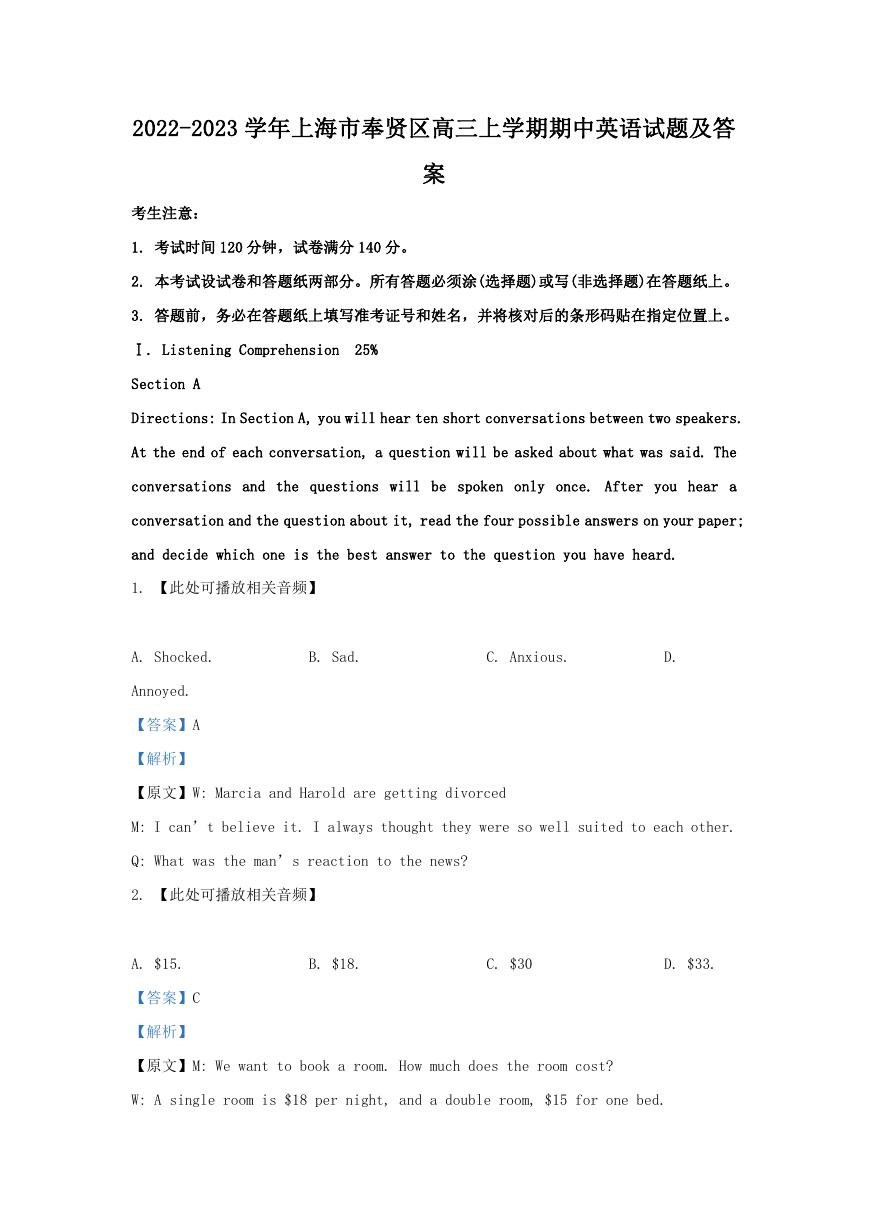

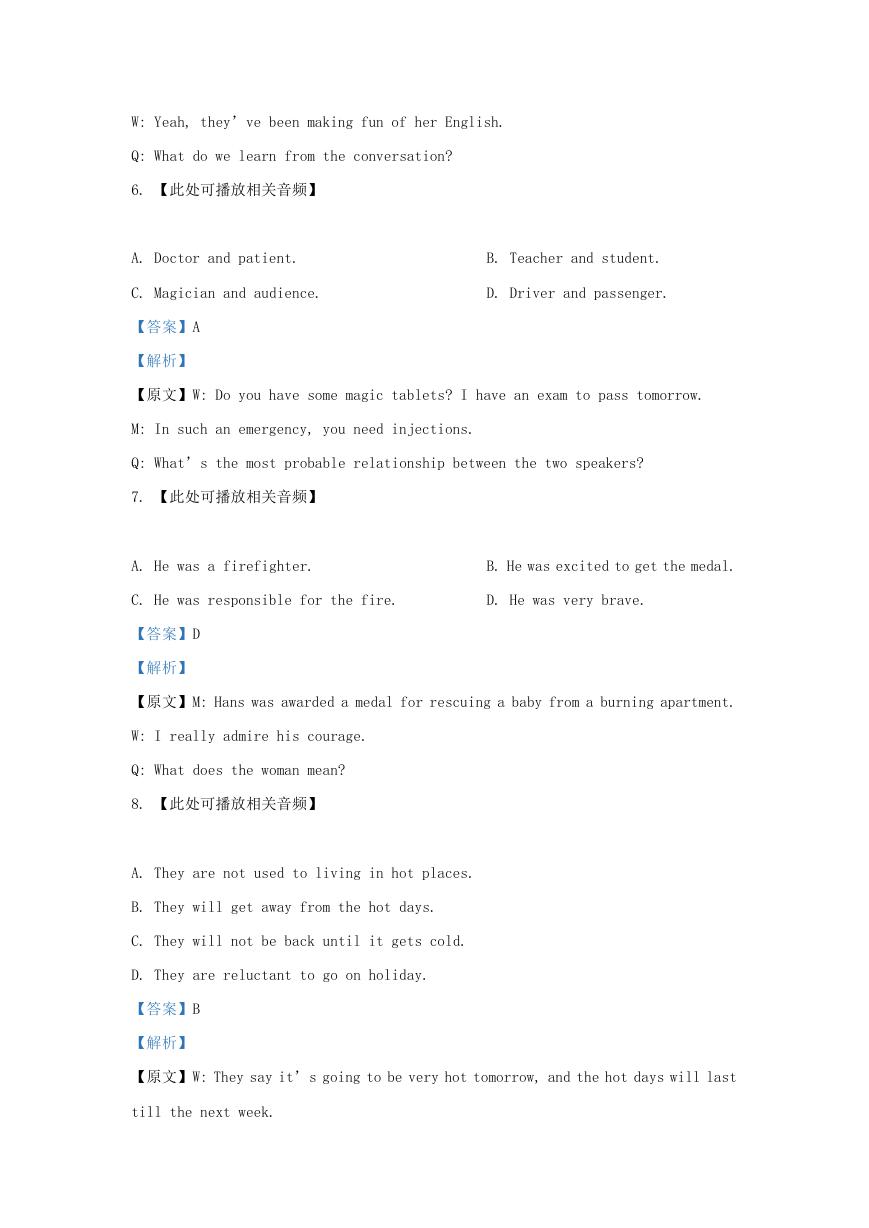
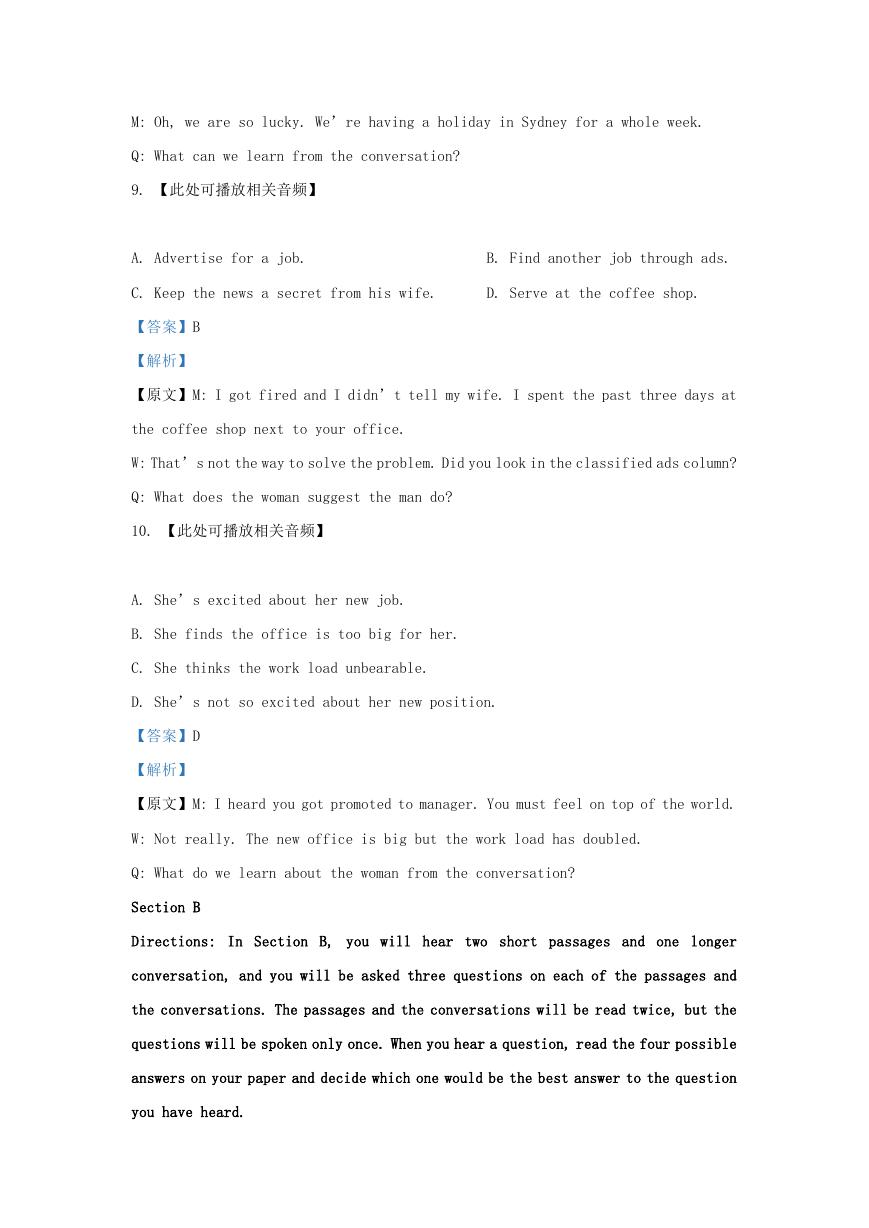
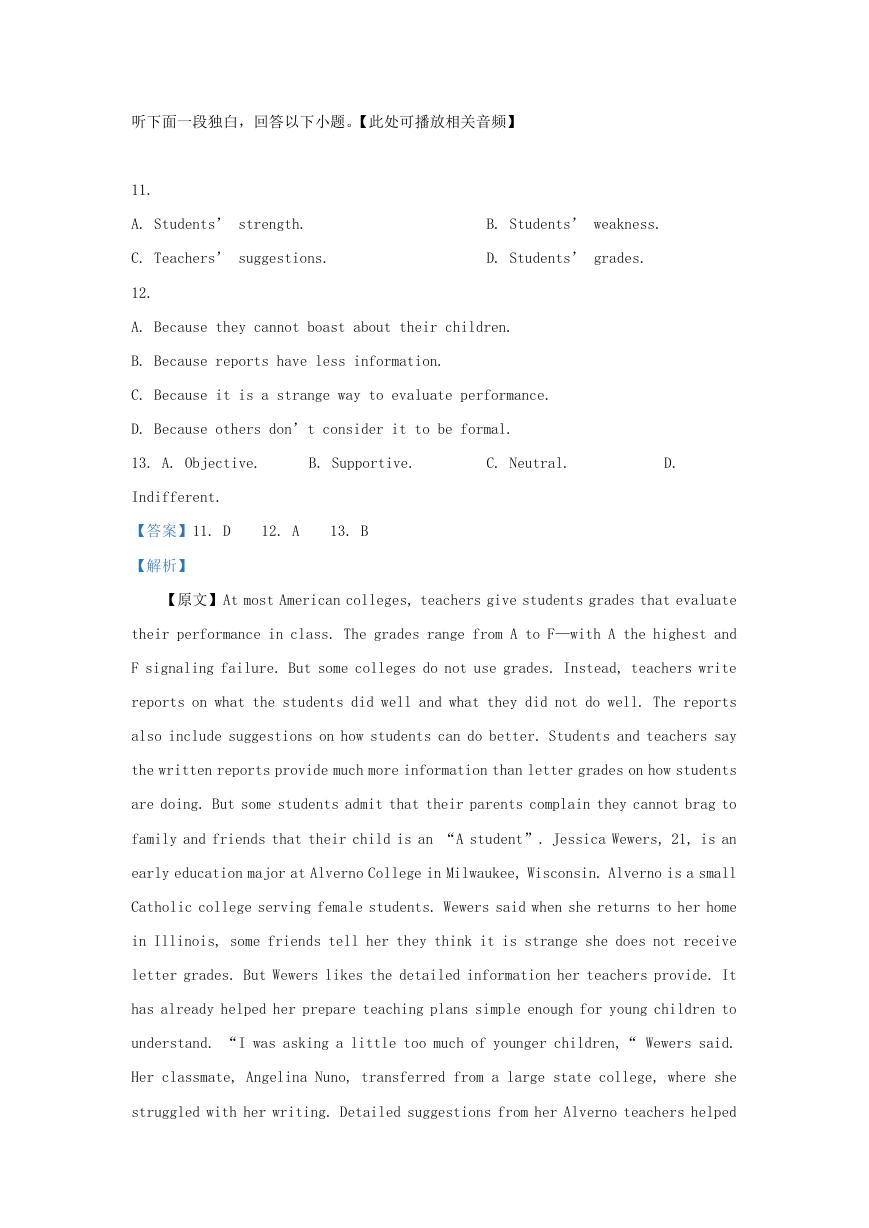
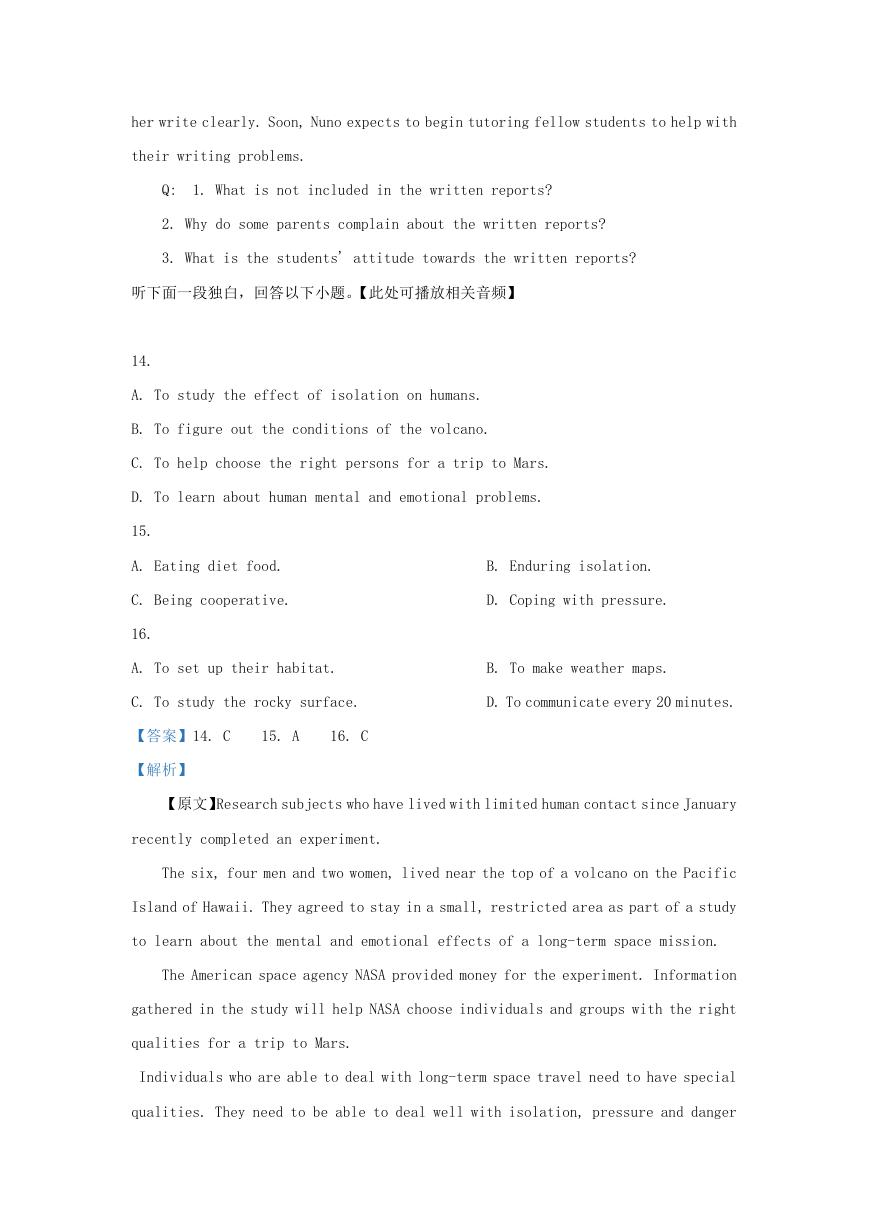

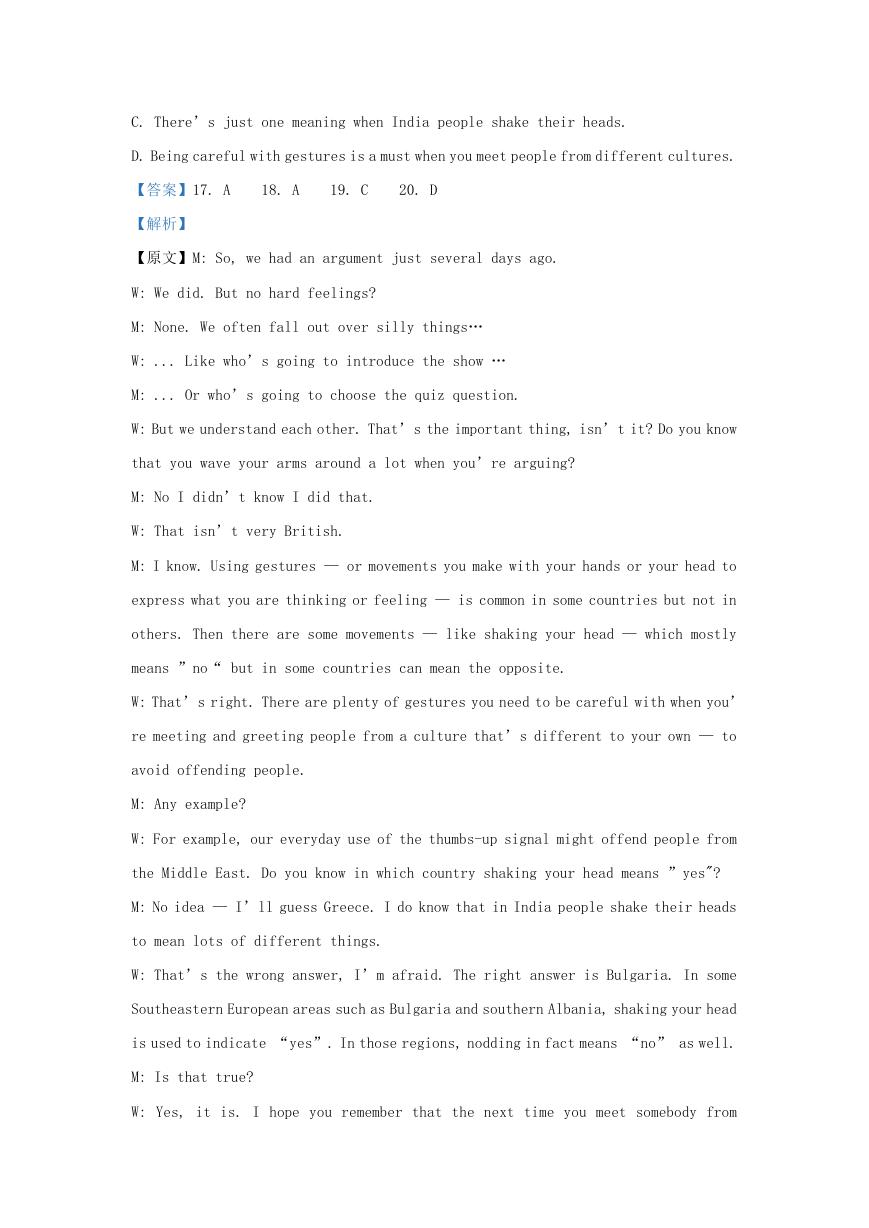








 2023年江西萍乡中考道德与法治真题及答案.doc
2023年江西萍乡中考道德与法治真题及答案.doc 2012年重庆南川中考生物真题及答案.doc
2012年重庆南川中考生物真题及答案.doc 2013年江西师范大学地理学综合及文艺理论基础考研真题.doc
2013年江西师范大学地理学综合及文艺理论基础考研真题.doc 2020年四川甘孜小升初语文真题及答案I卷.doc
2020年四川甘孜小升初语文真题及答案I卷.doc 2020年注册岩土工程师专业基础考试真题及答案.doc
2020年注册岩土工程师专业基础考试真题及答案.doc 2023-2024学年福建省厦门市九年级上学期数学月考试题及答案.doc
2023-2024学年福建省厦门市九年级上学期数学月考试题及答案.doc 2021-2022学年辽宁省沈阳市大东区九年级上学期语文期末试题及答案.doc
2021-2022学年辽宁省沈阳市大东区九年级上学期语文期末试题及答案.doc 2022-2023学年北京东城区初三第一学期物理期末试卷及答案.doc
2022-2023学年北京东城区初三第一学期物理期末试卷及答案.doc 2018上半年江西教师资格初中地理学科知识与教学能力真题及答案.doc
2018上半年江西教师资格初中地理学科知识与教学能力真题及答案.doc 2012年河北国家公务员申论考试真题及答案-省级.doc
2012年河北国家公务员申论考试真题及答案-省级.doc 2020-2021学年江苏省扬州市江都区邵樊片九年级上学期数学第一次质量检测试题及答案.doc
2020-2021学年江苏省扬州市江都区邵樊片九年级上学期数学第一次质量检测试题及答案.doc 2022下半年黑龙江教师资格证中学综合素质真题及答案.doc
2022下半年黑龙江教师资格证中学综合素质真题及答案.doc